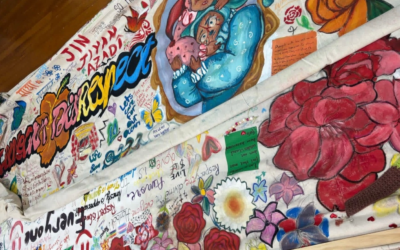
Source: Happy Mag
Key topics: hospitality, customer, abuse, mental health.
The shutter doors were mostly closed, and the lights were just about to be switched off. A group of three suddenly appeared by the gap in the door.
“Sorry we’re closed for the day,” I said. Ignored as if I hadn’t said a word, they continue to step inside. After one more seemingly futile attempt, I repeat, “Sorry, we … are … closed …” speaking louder and clearer this time. Before finally walking out, I was met with a look of confusion at the fact that a café with most of the lights turned off, and the roller doors nearly shut could ever be … closed.
Imagine for a moment, that you could stare a person in the face, and mouth a phrase three times with their attention entirely on you – and yet continue to be ignored by them.
This is the reality of many hospitality workers in Australia. From those more invested in their phone conversation rather than ordering, to the occasional customer who threatens to stab you for failing to refund them 70 cents for the extra coffee shot that “you didn’t give them.” All in all, the experience of hospitality workers across this great land is filled with examples of encounters with morally repugnant human beings.
As humans, we tend to internalise and remember threatening or personally negative events and occurrences. This is an evolutionary adaptation designed to help us remember and learn from and respond to these experiences should they come again. In saying this, the good and honest folk who make up the bulk of café clientele are overlooked all too often.
Often in hospitality, young and inexperienced individuals are thrown into the deep end and expected to absorb bad customer behaviour naturally and without complaint. This often does not end well – mostly for the worker.
Supportive cafés and management are needed
My experience, in a supportive, stable café environment, has helped me personally stave off the worst side-effects of continued customer abuse. Part of this has come from recurrently good experiences with my regular clientele – who are some of the most incredible people I have ever met. Another source of strength comes from family.
The mental health ramifications of customer abuse and the mental wellbeing of hospitality workers is a conversation that is desperately needed right now. It’s a dialogue that has remained suppressed for too long.
Anyone who has ever worked in a customer-facing role knows all too well that the customer is often wrong. That does not mean to say workers should provide poor service, indeed it amplifies the need for more effective communication and tailored service provision.
But what most customers fail to appreciate is that workers in hospitality (often poorly paid, over-worked, stressed and physically exhausted) experience abuse frequently. Sydney is notorious for its fast-paced lifestyle, this same lifestyle has fuelled a “rush-economy” that prioritises speed above all else. This includes our daily interactions with baristas, waiters and other hospitality professionals. We expect fast service, low prices and good food and drinks.
Only, quality takes time. The only options available to you, from our point of view, are:
- Good food, service and quality = expensive and time-consuming, expect to wait a little while, and you will get service with a smile.
- Bad food, service and shite quality = cheap, and quick, expect at least three hairs and a used Band-Aid as an added extra, absolutely free!
- Atrocious food, non-existent service, infinitesimally bad quality = very, very cheap, lots of abuse hurled AT you by staff, long wait times, a couple of pubes in your soup and coffee that literally tastes like ground dirt.
Realistically, of course, cafés will do their absolute best to provide you with a memorable experience.
A discussion that is sorely needed
COVID-19 has refreshed our national conversation about mental health. The state of mental health will likely deteriorate further for hospitality workers given the uncertainties regarding their employment. Our customers also face uncertain times as jobs are shed by the cart-load, and hundreds of thousands of Australians face the very real threat of unemployment.
During these times, I have noticed an upsurge in positive customer behaviour over the past two months. On a positive note, people have gone above and beyond to help their local. Small, yet meaningful changes, that extra smile, that little tip, the “how have you guys been” all make a change in our lives as workers in this field. Perhaps naively, I hope these dramatic circumstances will influence changes sustainable enough to affect permanent relational adjustment between workers and customers.
Maybe then some bad eggs will learn to listen to the narratives of the people they consider “beneath them”. You know, the very same people sustaining the economy right now. The non-important, under-appreciated non-essential, essential hospitality workers.



